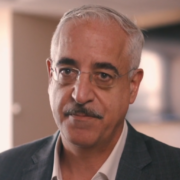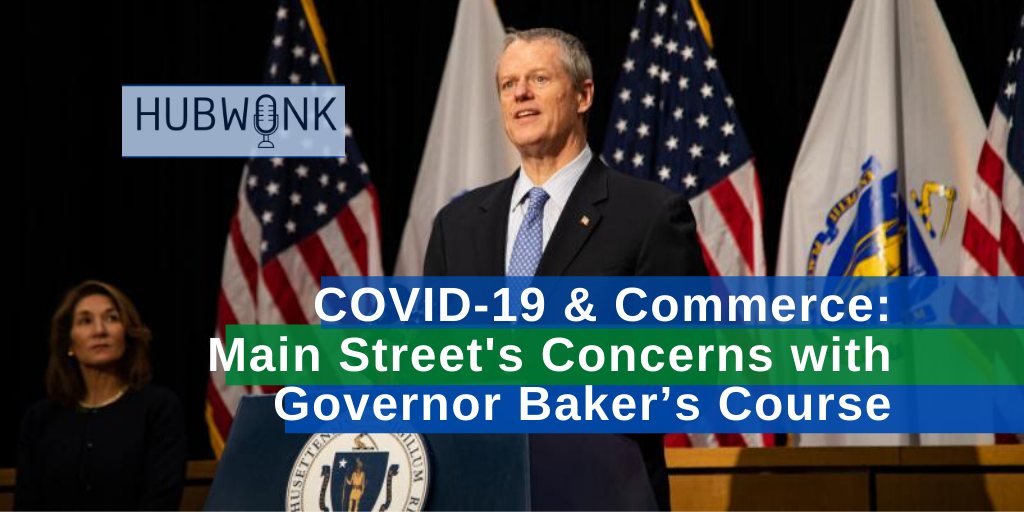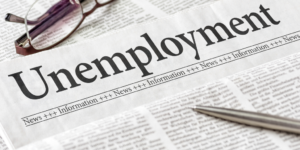2020 Annual Report
Letter from the Executive Director & Chair
From Recovery to Renewal, Pioneer Institute’s 2020 annual report, lands on your desk as America turns the page on COVID-19.
In 2020, Pioneer was an extremely active participant in improving the state’s pandemic response, with weekly releases of data analyses and tools, public discourse, and real-time policy solutions. We promoted improvements to remote learning and school reopening plans in the face of intransigent teacher unions; protections for residents of elder care facilities; public access to infection and testing data; and vaccine distribution. We advanced ideas to safely reopen our businesses and support hard-hit industries and workers, increase state and local government transparency, and safeguard civil liberties and civil rights.
In From Recovery to Renewal, you will also read about how the Institute secured wins on our top priorities: a Supreme Court victory for school choice; fundamental changes to telehealth and scope of practice regulations; and transparency in healthcare prices.
We continued laying the groundwork to increase school choice in Massachusetts and across the country. We have expanded our partnerships to end the use of arbitrary “cost-effectiveness” reviews which devalue human life in the name of drug affordability.
Pioneer helped businesses, policymakers and the media navigate the economic impact of pandemic policies using our MassEconomix® data tool, which has in recent months proven to be instrumental in analyzing the devastating effects of a proposed constitutional amendment to establish a graduated income tax.
Finally, with so much change afoot, Pioneer is transforming itself in accordance with our Pioneer2024 strategic plan, to become even more effective at delivering policy reforms.
In 2021, the Institute will break ground on a standalone litigation 501(c)3 organization, PioneerLegal. The new entity will reinvigorate the education reform debate. Pioneer is investing to substantially increase our communications reach in the coming years.
As one contributor recently noted, Pioneer is “the adult in the room”: rational, empathetic, principled, and always eager for new ideas. Pioneer eschews the reflexive partisan politicking that marks so many organizations and media culture today.
We are sincerely grateful for your deeper investment in Pioneer. In 2020, the Institute received contributions of $3.3 million, an increase of nearly 40 percent over 2019.
That is strong evidence that the citizens of Massachusetts and the nation yearn for Pioneer’s reasoned, data-driven and problem-solving approach to public policy challenges.
We thank you for your trust and commitment at this critical moment for Massachusetts and the country.
– Jim Stergios and Adam Portnoy
Pioneer: By The Numbers
1.6 Billion
Total Media Reach
113.6K
Total Downloads of Pioneer Research in 2020
42
Publications: Research Papers, Policy Briefs, Testimony, & Event Transcripts
3576
Media Hits: Articles, Interviews, & Editorials in Newspapers, Trade Journals, TV, & Radio in Massachusetts & Across the Nation
41
Events featuring Pioneer
186
Average Attendees per Pioneer Event
Pioneer Education – Renewing Our Commitment to Students: Excellence & Choice
Pioneer Institute has long recognized that a high-quality K-12 education is the surest route to economic opportunity and success in life. Our future generations rely on our schools to put them on a path to informed citizenship and career readiness. But COVID-19 and racial tensions across the country have thrown into stark relief the failings of our public education system. The rigid, one-size-fits-all model is neither meeting the needs of our diverse learners, nor the changing demands of working parents. For over 30 years, Pioneer has tirelessly promoted more flexible options that improve student outcomes, through online learning and homeschooling; and choice through public charter, vocational technical, private, and parochial schools, and the METCO program. Pioneer also supports system-wide reforms to public schools, especially in underperforming districts. In 2020, Pioneer played an important role in reopening Massachusetts schools; sharing remote learning resources and best practices; influencing a landmark U.S. Supreme Court decision that will help hundreds of thousands of families attend private and religious schools; and amplifying the voices of people of color, to improve academic outcomes for minority students and address the nation’s ongoing inequality and civil unrest. Delivering high-quality instruction during a pandemic Though young people did not suffer as severe a health impact as a result of COVID-19, students have experienced an estimated seven months of learning loss due to pandemic-related school closures, and low-income and minority students have been hardest hit. Pioneer has focused
Pioneer Institute has long recognized that a high-quality K-12 education is the surest route to economic opportunity and success in life. Our future generations rely on our schools to put them on a path to informed citizenship and career readiness. But COVID-19 and racial tensions across the country have thrown into stark relief the failings of our public education system. The rigid, one-size-fits-all model is neither meeting the needs of our diverse learners, nor the changing demands of working parents.
For over 30 years, Pioneer has tirelessly promoted more flexible options that improve student outcomes, through online learning and homeschooling; and choice through public charter, vocational technical, private, and parochial schools, and the METCO program. Pioneer also supports system-wide reforms to public schools, especially in underperforming districts. In 2020, Pioneer played an important role in reopening Massachusetts schools; sharing remote learning resources and best practices; influencing a landmark U.S. Supreme Court decision that will help hundreds of thousands of families attend private and religious schools; and amplifying the voices of people of color, to improve academic outcomes for minority students and address the nation’s ongoing inequality and civil unrest.
“STUDENTS STILL NEED TO LEARN DURING THE CORONAVIRUS PANDEMIC”
“[P]arents are right to be frustrated at the lack of preparation or urgency around online learning. State and local governments spend more than $10 billion annually on public schools… Just as we have seen the embrace of telehealth to ensure that health care needs are met during the coronavirus pandemic, state and local officials must remove obstacles to digital learning so education needs are also met.” – JIM STERGIOS, THE BOSTON GLOBE
Delivering high-quality instruction during a pandemic
 Though young people did not suffer as severe a health impact as a result of COVID-19, students have experienced an estimated seven months of learning loss due to pandemic-related school closures, and low-income and minority students have been hardest hit. Pioneer has focused on serving as a resource for parents, educators, leaders and policymakers at the school, district and state levels, offering lessons from other models and other parts of the world, on best practices for safely reopening schools, and for delivering high-quality remote instruction. The pandemic has demonstrated the market’s responsiveness to parent demand for alternatives, and Pioneer helped bring wider attention to pods and micro-schools, homeschooling, and the remarkably resilient and adaptable private, religious, and vocational-technical schools.
Though young people did not suffer as severe a health impact as a result of COVID-19, students have experienced an estimated seven months of learning loss due to pandemic-related school closures, and low-income and minority students have been hardest hit. Pioneer has focused on serving as a resource for parents, educators, leaders and policymakers at the school, district and state levels, offering lessons from other models and other parts of the world, on best practices for safely reopening schools, and for delivering high-quality remote instruction. The pandemic has demonstrated the market’s responsiveness to parent demand for alternatives, and Pioneer helped bring wider attention to pods and micro-schools, homeschooling, and the remarkably resilient and adaptable private, religious, and vocational-technical schools.
Within the first week of the COVID-19 outbreak, Pioneer made linkages between nationally recognized virtual learning practitioners and Massachusetts education commissioner Jeffrey Riley, and leaders in the voc-tech, Catholic, and charter sectors. Pioneer worked with Julie Young, founder of Florida Virtual School and currently with ASU Digital Prep, to advise the Archdiocese of Boston schools on an online Catholic academy, which is currently in development. Pioneer shared expertise and showcased effective online programs through: research and op-eds co-authored with ASU Prep Digital and the Distance Learning Association; a virtual policy briefing series featuring Young and Christensen Institute co-founder Michael Horn; and a 20-part remote learning resources guide drawn from hundreds of materials across the curriculum and curated by PioneerEducation Director Jamie Gass. Pioneer devoted numerous episodes of its The Learning Curve national education podcast to models of success with experts and commentary on homeschooling, digital learning, micro-schools, and remote learning resources.
Pioneer highlighted COVID response best practices from two Catholic schools, Boston College High School and Saint Joseph Prep, through a video campaign and op-eds placed across Massachusetts. These two schools offered consistent, structured, rigorous, and supportive instructional programs via remote learning that kept students engaged. After Pioneer’s targeted social media campaign, Massachusetts’ Catholic schools won national recognition in The Wall Street Journal and Fox News, and at a time of enrollment declines nationally, increased their own enrollment by 4,400 students.
Best practices for remote instruction & in-person learning
 Building on a decade of award-winning digital learning initiatives, Pioneer encouraged state leaders to modernize online education offerings and bring them into parity with other leading states, remove bureaucratic regulations and geographic restrictions on enrollment, end funding disparities, and address the digital divide. Pioneer published a series of reports: Keeping Students Academically Engaged During the Coronavirus Crisis, Class Dismissed: Massachusetts’ Lack of Preparedness for K–12 Digital Learning During COVID-19, Shifting to Online Learning in the COVID-19 Spring, Accountability in Massachusetts’ Remote Learning Regulations, and How Should Massachusetts Reopen Its K–12 Schools in the Fall? Lessons from Abroad and Other States. The series offered remote learning and safe school reopening guidance from experts in the U.S. and other countries, and urged state and federal policymakers to articulate clear guidelines on school closures, a plan to avoid future learning gaps, and standard criteria for instructional time and grading. Another report by Pioneer and ASU Prep Digital, Shifting Special Needs Students to Online Learning in the COVID-19 Spring, presented practical tips and ways for the state education department to address issues of equity.
Building on a decade of award-winning digital learning initiatives, Pioneer encouraged state leaders to modernize online education offerings and bring them into parity with other leading states, remove bureaucratic regulations and geographic restrictions on enrollment, end funding disparities, and address the digital divide. Pioneer published a series of reports: Keeping Students Academically Engaged During the Coronavirus Crisis, Class Dismissed: Massachusetts’ Lack of Preparedness for K–12 Digital Learning During COVID-19, Shifting to Online Learning in the COVID-19 Spring, Accountability in Massachusetts’ Remote Learning Regulations, and How Should Massachusetts Reopen Its K–12 Schools in the Fall? Lessons from Abroad and Other States. The series offered remote learning and safe school reopening guidance from experts in the U.S. and other countries, and urged state and federal policymakers to articulate clear guidelines on school closures, a plan to avoid future learning gaps, and standard criteria for instructional time and grading. Another report by Pioneer and ASU Prep Digital, Shifting Special Needs Students to Online Learning in the COVID-19 Spring, presented practical tips and ways for the state education department to address issues of equity.
Pioneer published op-eds disseminating these findings in The Boston Globe, CommonWealth magazine, and state and national outlets. In its revised regulations, the state education department adopted two Pioneer proposals regarding the maintenance of the spring 2021 MCAS and local district grading for accountability. Through an online COVID resources hub, Pioneer provided an interactive map of districts’ in-person, remote, or hybrid reopening plans so the public could cross-reference the data with town-by-town case prevalence using Pioneer’s COVID mapping tool. Through these efforts, Pioneer played an instrumental role in providing the research basis for the Baker administration’s stronger stance in support of reopening Massachusetts schools in the fall.
The Learning Curve – Pioneer’s Education Podcast
Popular Episodes
MA Commissioner Jeff Riley on Remote Learning, Voc-Techs, & Reforming Boston’s Schools
This week on “The Learning Curve,” Cara and Gerard open with commentary on the George Floyd tragedy and K-12 education’s role in addressing racial injustice. Then, they are joined by Jeffrey Riley, the Massachusetts Commissioner of Elementary and Secondary Education, to talk about the unprecedented challenges of COVID-19. Click here to listen.
U-Arkansas Prof. Patrick Wolf on School Choice, Espinoza, & Students’ Civic Prep
U-Arkansas Prof. Patrick Wolf joins The Learning Curve to discuss school choice, the Supreme Court’s Espinoza case, & students’ civic preparation. Click here to listen.
Widow of Civil Rights Icon, Dr. Sephira Shuttlesworth on Desegregating Schools & Racial Equity
This week on “The Learning Curve,” Cara and Gerard are joined by Dr. Sephira Shuttlesworth, a retired teacher and charter school leader, and the widow of the late Birmingham, Alabama, civil rights leader, the Rev. Fred Shuttlesworth. Click here to listen.
Bringing home a win for school choice
 Thousands of families across Massachusetts could potentially benefit from the exceptional instructional programs offered by Catholic schools, thanks to the courage of a single mom from Montana, Kendra Espinoza. Blaine Amendments block educational opportunity for parents like Kendra in nearly 40 states, including Massachusetts. Pioneer has been urging repeal of these barriers to school choice for decades, through a film, publications, and public forums highlighting their bigoted history and the benefits of Jewish Day and Catholic Schools. Espinoza fought all the way to the Supreme Court, where only 80 out of 8,000 cases are heard annually, for the right to access state scholarship funds for her daughters to attend a religious school. Pioneer filed amicus briefs with the Institute for Justice and partners nationwide and provided platforms to share her story and ensure her case received a hearing. Pioneer also placed opeds in The Hechinger Report, The Hill, The Boston Pilot, and regional newspapers and legal outlets. The Supreme Court’s landmark ruling was a victory for potentially millions of families. To finally dismantle these legal obstacles to school choice, Massachusetts and other states must enact statutory changes. Pioneer will be distributing a toolkit to help states establish tax credit scholarship programs.
Thousands of families across Massachusetts could potentially benefit from the exceptional instructional programs offered by Catholic schools, thanks to the courage of a single mom from Montana, Kendra Espinoza. Blaine Amendments block educational opportunity for parents like Kendra in nearly 40 states, including Massachusetts. Pioneer has been urging repeal of these barriers to school choice for decades, through a film, publications, and public forums highlighting their bigoted history and the benefits of Jewish Day and Catholic Schools. Espinoza fought all the way to the Supreme Court, where only 80 out of 8,000 cases are heard annually, for the right to access state scholarship funds for her daughters to attend a religious school. Pioneer filed amicus briefs with the Institute for Justice and partners nationwide and provided platforms to share her story and ensure her case received a hearing. Pioneer also placed opeds in The Hechinger Report, The Hill, The Boston Pilot, and regional newspapers and legal outlets. The Supreme Court’s landmark ruling was a victory for potentially millions of families. To finally dismantle these legal obstacles to school choice, Massachusetts and other states must enact statutory changes. Pioneer will be distributing a toolkit to help states establish tax credit scholarship programs.
Lead Plaintiff Kendra Espinoza & IJ’s Attorney Erica Smith on Landmark SCOTUS School Choice Decision
In a special segment of “The Learning Curve,” Cara and Gerard are honored to be joined by Kendra Espinoza, lead plaintiff in the landmark U.S. Supreme Court case, Espinoza v. Montana Department of Revenue, and Erica Smith, an attorney with the Institute for Justice, which represented the plaintiffs.
Matching talent with demand: Vocational-technical education
 Vocational-technical schools are an important alternative to traditional district schools in Massachusetts. They are a crucial choice model, serving as a pipeline to economic opportunity for those not on a college track. Pioneer reports, video promotion campaigns, and dozens of op-eds dating back to 2008 have demonstrated that these schools have become a national model, with growing waitlists, low dropout rates, and partnerships with businesses to help meet the skills shortage and strengthen the state’s economy. Since 2017, the Baker administration has committed over $90 million through the Skills Capital Grant program to increase these schools’ job-training offerings in high-demand occupations, benefiting 16,000 more students. Voc-techs serve twice the state average of special needs students, but local political leaders and interest groups are agitating to replace their entrance criteria with a random lottery system. Pioneer Senior Fellow Tom Birmingham joined with former Massachusetts Lt. Governor Tim Murray to pen op-eds in CommonWealth magazine and regional news outlets across the state continuing Pioneer’s call for expansion of voc-tech schools, and making the case for ensuring a match between voc-techs’ specialized occupational education mission and the preparedness of the students who attend. Pioneer also pressed state education commissioner Jeffrey Riley on expansion of voc-techs in an appearance on our podcast.
Vocational-technical schools are an important alternative to traditional district schools in Massachusetts. They are a crucial choice model, serving as a pipeline to economic opportunity for those not on a college track. Pioneer reports, video promotion campaigns, and dozens of op-eds dating back to 2008 have demonstrated that these schools have become a national model, with growing waitlists, low dropout rates, and partnerships with businesses to help meet the skills shortage and strengthen the state’s economy. Since 2017, the Baker administration has committed over $90 million through the Skills Capital Grant program to increase these schools’ job-training offerings in high-demand occupations, benefiting 16,000 more students. Voc-techs serve twice the state average of special needs students, but local political leaders and interest groups are agitating to replace their entrance criteria with a random lottery system. Pioneer Senior Fellow Tom Birmingham joined with former Massachusetts Lt. Governor Tim Murray to pen op-eds in CommonWealth magazine and regional news outlets across the state continuing Pioneer’s call for expansion of voc-tech schools, and making the case for ensuring a match between voc-techs’ specialized occupational education mission and the preparedness of the students who attend. Pioneer also pressed state education commissioner Jeffrey Riley on expansion of voc-techs in an appearance on our podcast.
Amplifying voices on civil rights and school reform
 The METCO program, an exceptional school choice option available to Massachusetts schoolchildren, is a proven asset in furthering the Civil Rights goal of educational equity. METCO places over 3,000 largely African-American and Hispanic students from Boston and Springfield in high-performing schools in affluent suburbs. Over the years, Pioneer has advocated for expanding the program and increasing its funding to accommodate the 9,000 students on its waitlist. Pioneer published two reports on the program’s success in terms of MCAS proficiency, graduation rates, and college attendance. More recently, Pioneer partnered with METCO to produce and promote a digital marketing campaign and video series that was featured at METCO’s annual meeting at The Boston Foundation and received 60,000 views, focusing on personal narratives from students and their non-METCO peers, as well as interviews with METCO program leaders. Pioneer published Madison Park Technical Vocational High School Turnaround Update, the first of a two-part series reviewing academic performance and career support at Boston’s only voc-tech option, whose student population is 94 percent Black, and shared the findings with The Boston Globe in support of its ongoing coverage of progress at the school. PioneerEducation Director Jamie Gass has published numerous op-eds on America’s Civil Rights Movement, highlighting great figures and momentous events to remind the public and our political leadership of the need to ensure students are taught our shared history of slavery and the struggle for racial equality. Through our weekly podcast, “The Learning Curve,” Gass ensures that guests reflect our nation’s diversity, scheduling appearances by accomplished individuals who encourage exploration of African-American history and literature, or who promote pathways toward urban school reform. These guests have included New York Times bestselling children’s author and poet Carole Boston Weatherford, school choice advocate Dr. Howard Fuller, Civil Rights activist and former charter school leader Dr. Sephira Shuttlesworth, Emmett Till biographer Devery Anderson and many more.
The METCO program, an exceptional school choice option available to Massachusetts schoolchildren, is a proven asset in furthering the Civil Rights goal of educational equity. METCO places over 3,000 largely African-American and Hispanic students from Boston and Springfield in high-performing schools in affluent suburbs. Over the years, Pioneer has advocated for expanding the program and increasing its funding to accommodate the 9,000 students on its waitlist. Pioneer published two reports on the program’s success in terms of MCAS proficiency, graduation rates, and college attendance. More recently, Pioneer partnered with METCO to produce and promote a digital marketing campaign and video series that was featured at METCO’s annual meeting at The Boston Foundation and received 60,000 views, focusing on personal narratives from students and their non-METCO peers, as well as interviews with METCO program leaders. Pioneer published Madison Park Technical Vocational High School Turnaround Update, the first of a two-part series reviewing academic performance and career support at Boston’s only voc-tech option, whose student population is 94 percent Black, and shared the findings with The Boston Globe in support of its ongoing coverage of progress at the school. PioneerEducation Director Jamie Gass has published numerous op-eds on America’s Civil Rights Movement, highlighting great figures and momentous events to remind the public and our political leadership of the need to ensure students are taught our shared history of slavery and the struggle for racial equality. Through our weekly podcast, “The Learning Curve,” Gass ensures that guests reflect our nation’s diversity, scheduling appearances by accomplished individuals who encourage exploration of African-American history and literature, or who promote pathways toward urban school reform. These guests have included New York Times bestselling children’s author and poet Carole Boston Weatherford, school choice advocate Dr. Howard Fuller, Civil Rights activist and former charter school leader Dr. Sephira Shuttlesworth, Emmett Till biographer Devery Anderson and many more.
“Emmett Till would have celebrated his 79th birthday in July, and we’ll never know what he would have become: preacher, teacher, civil rights leader? Clearly, ignorance and racial violence persist in America. To ensure that they don’t prevail over justice and the rule of law, we need to honor our shared past by successfully delivering historical truths to our kids, and expanding educational opportunities.” – JAMIE GASS, WORCESTER TELEGRAM & GAZETTE
Pioneer Health – Putting Patients First: Access, Affordability, & Innovation
By March 2020, the COVID-19 pandemic brought the world to a standstill, laying bare both the strengths and weaknesses of our ability to respond to an unprecedented public health crisis. Pioneer used its communications platforms to provide timely, high-quality information to the public. The Institute also recognized that many of the reforms we have long proposed would help address the needs of patients and immediately put those proposals before state leaders. In 2020, Pioneer helped open up access for hundreds of thousands of patients to basic medical services delivered by trained nurses and through telehealth. Pioneer research and advocacy for greater public transparency and more targeted efforts to stop the spread prompted state agencies to provide useful data on COVID case prevalence at the local level and in long-term care facilities. As high COVID fatality rates at nursing homes drew national media and government scrutiny, Pioneer quickly produced research on best practices for nursing homes and hospitals, many of which the Baker administration has adopted. The Institute’s life sciences initiative focused on protecting seniors and those with disabilities and chronic illnesses from discrimination in treatments for COVID and other ailments, and promoted better access to the latest therapies. Pioneer research also helped enact a historic federal rule enforcing disclosure of healthcare prices.
Safeguarding COVID’s most vulnerable victims
 Pioneer has long promoted innovative policy solutions to ensure that seniors enjoy a high quality of life, and when this population bore the brunt of the COVID surge, Pioneer focused on addressing COVID spread especially in nursing homes. Early on, the Institute brought attention to the factors that contributed to the tragic loss of one in six residents at long-term care facilities.
Pioneer has long promoted innovative policy solutions to ensure that seniors enjoy a high quality of life, and when this population bore the brunt of the COVID surge, Pioneer focused on addressing COVID spread especially in nursing homes. Early on, the Institute brought attention to the factors that contributed to the tragic loss of one in six residents at long-term care facilities.
Pioneer was among the first to call for increased transparency on COVID case prevalence and fatalities at the city and town level across the state, a reform which was echoed by The Boston Globe, and adopted by the Department of Public Health (DPH). Pioneer Senior Fellow Michael Walker leveraged the DPH data to create and release COVID-related interactive “trackers” that enable users to view key information, updated weekly, on the spread of the virus and fatalities by locality and for long-term care facilities.
An April report by Barbara Anthony raised important concerns about lack of equity in the DPH’s revised Crisis of Care Standards, which rely on a mathematical formula to determine the allocation of then-scarce life-sustaining equipment and treatment. The report received coverage on Boston.com and The Washington Times, and Anthony appeared on NBC Boston. The DPH soon revised its guidelines for how hospitals determine eligibility for ventilators.
Research by Greg Sullivan and Andrew Mikula identified weak federal staffing standards for nursing hours per resident day as an important cause of the widely covered tragedy at the Holyoke Soldiers’ Home. The report received coverage in radio, TV, and print outlets throughout Massachusetts. In response, the Baker administration issued improved nursing home staffing standards.
Op-eds and blogs by Anthony and Mary Connaughton in WGBH and regional news outlets, as well as additional blogs by Mikula and author and attorney David Clancy, called for the state to improve its reporting on the impact of COVID by age group, and on those with dementia. These recommendations received coverage by the Boston Herald and The Berkshire Eagle.
In an “Open Letter” to the legislatively created COVID-19 Task Force, Pioneer offered numerous practical, near-term recommendations, including specific actions on transparency, equipment, testing, and reducing spread. The letter earned extensive coverage in The Boston Globe, including an editorial endorsement, and was reported on by national news outlets. Anthony was quoted in The Boston Globe Spotlight Team’s three-part series covering managerial mistakes in the crisis’ early stages. The Baker administration adopted many of Pioneer’s recommendations in its Nursing Facility Accountability and Supports Package, as well as a Pioneer suggestion to prioritize nursing homes for vaccine distribution.
PIONEER IN THE PRESS: Watch Pioneer’s Barbara Anthony on NBC Boston:
Raising patients’ awareness & engagement
 Pioneer promoted greater transparency in healthcare pricing, which is essential for patients to seek high-value, low-cost services. A Pioneer report, Analysis of Spending on Shoppable Services in Massachusetts, projected consumer savings in one Massachusetts county if patients were to switch providers for 16 non-emergency healthcare services. Another report, The Status of Healthcare Price Transparency Across the United States, surveyed states on price transparency laws and the availability of cost information. These reports received coverage in several noteworthy industry publications, and the findings were amplified in op-eds published in The Hill, CommonWealth magazine, and regional outlets across Massachusetts supporting passage of a federal healthcare price transparency law, which took effect in January 2021.
Pioneer promoted greater transparency in healthcare pricing, which is essential for patients to seek high-value, low-cost services. A Pioneer report, Analysis of Spending on Shoppable Services in Massachusetts, projected consumer savings in one Massachusetts county if patients were to switch providers for 16 non-emergency healthcare services. Another report, The Status of Healthcare Price Transparency Across the United States, surveyed states on price transparency laws and the availability of cost information. These reports received coverage in several noteworthy industry publications, and the findings were amplified in op-eds published in The Hill, CommonWealth magazine, and regional outlets across Massachusetts supporting passage of a federal healthcare price transparency law, which took effect in January 2021.
Ensuring patient access to vital medical services
 The COVID outbreak required a greater response from the healthcare system to meet the needs of pandemic victims, shifting resources from other patients and creating a shortage of medical personnel. Pioneer has long supported increasing patient access to care provided through registered nurses and telemedicine, to ease wait times and lower costs, going back to research from 2015 on expanding scope-of-practice laws to allow state-certified nurse practitioners to provide some medical services. A 2017 Pioneer study on telemedicine, covered by WBUR and other news outlets, highlighted its potential to reduce healthcare costs and shorten treatment times. In just the beginning phases of the pandemic, community health centers across Massachusetts reported that total telehealth visits increased from 500 to 83,000, and from 500 to 22,000 for behavioral health services.
The COVID outbreak required a greater response from the healthcare system to meet the needs of pandemic victims, shifting resources from other patients and creating a shortage of medical personnel. Pioneer has long supported increasing patient access to care provided through registered nurses and telemedicine, to ease wait times and lower costs, going back to research from 2015 on expanding scope-of-practice laws to allow state-certified nurse practitioners to provide some medical services. A 2017 Pioneer study on telemedicine, covered by WBUR and other news outlets, highlighted its potential to reduce healthcare costs and shorten treatment times. In just the beginning phases of the pandemic, community health centers across Massachusetts reported that total telehealth visits increased from 500 to 83,000, and from 500 to 22,000 for behavioral health services.
Early in the pandemic, Pioneer’s Senior Fellow in Healthcare, Josh Archambault, placed op-eds in Forbes and CommonWealth magazine, and provided information to state policymakers and legislators, urging adoption of a robust telehealth framework that removes barriers across state lines, and rejects payment mandates. The Governor issued three executive orders which included Pioneer’s input, and signed into law An Act Promoting a Resilient Health Care System That Puts Patients First, preserving both telehealth and scope of practice reforms.
A POWERFUL VOICE FOR VICTIMS
After the Institute for Clinical and Economic Review released an evaluation that would limit treatment options for cystic fibrosis (CF) patients, Pioneer partnered with Gunnar Esiason, a prominent advocate who is living with CF, to raise public awareness, on a webinar that received nearly 2,000 views, an op-ed in Morning Consult, and a report on the growing threat of drug-resistant infections that was featured prominently in Politico Pulse.
“ICER’s model does not value years of life equally for people who are terminally ill compared with people who are healthy.”
– Gunnar Esiason, in Morning Consultant
Protecting all patients & medical innovation
 Pioneer’s New England Life Sciences Initiative (NELSI), led by Visiting Fellow William Smith, has been raising awareness across the country about the dangers of applying the quality-adjusted life year (QALY) methodology, used by the Institute for Clinical and Economic Review (ICER), to issue decisions about patient eligibility for life-saving therapies. COVID brought new urgency to this disturbing and problematic approach. Through research, traditional and social media campaigns, and appearances at policy forums, NELSI continued its efforts to ensure that patients, their physicians, and caregivers — not ICER and other one-size-fits-all methods — have a say in such serious matters.
Pioneer’s New England Life Sciences Initiative (NELSI), led by Visiting Fellow William Smith, has been raising awareness across the country about the dangers of applying the quality-adjusted life year (QALY) methodology, used by the Institute for Clinical and Economic Review (ICER), to issue decisions about patient eligibility for life-saving therapies. COVID brought new urgency to this disturbing and problematic approach. Through research, traditional and social media campaigns, and appearances at policy forums, NELSI continued its efforts to ensure that patients, their physicians, and caregivers — not ICER and other one-size-fits-all methods — have a say in such serious matters.
A Pioneer report, Quality Adjusted Life Years (QALY): The Threat to Older Americans concluded that the QALY methodology has the potential to deny seniors’ access to high-quality, life-saving treatments. Another study, Legal Challenges of Adopting QALY Under the Americans with Disabilities Act (ADA), found that the QALY methodology would decrease the availability of effective treatments for people living with a disability. Pioneer amplified key findings through digital campaigns that earned over 100,000 web clicks, reaching over 500,000 people. Pioneer shared this research with U.S. Senator Warren and seven colleagues, who urged the federal government to ensure that the disabled and older adults do not face discrimination for COVID treatment.
Smith also published research and op-eds clearing up misconceptions about the pharmaceutical industry, and the obstacles it faces as it strives to develop breakthrough therapies. Pioneer’s report The Negative Impact of COVID-19 Upon the Biopharmaceutical Sector dispelled myths about these companies profiting from the pandemic. Another report, Five Reasons Why Drug Rebates Are Harmful to Patients and to the Healthcare System, critiqued the complex incentive structure between drug manufacturers, health plans, and pharmacy benefit managers, which distorts the market for branded drugs and boosts out-of-pocket costs for consumers.
Smith partnered with AEI’s Kirsten Axelson on an op-ed in The National Interest calling for the extension of a federal CARES Act provision allowing for 90-day prescription refills, especially helpful for patients with limited mobility. In an op-ed published by CommonWealth magazine and in a Bloomberg Bay State Business radio appearance, Smith vigorously opposed Governor Baker’s drug pricing penalty plan, which could harm innovative, life-saving research by Massachusetts companies.
CHECK OUT SOME HEALTHCARE AND LIFE SCIENCES CONTENT:
Legal Challenges of Adopting QALY Under the Americans with Disabilities Act (ADA)
Limitations of QALYs in Cost-Effectiveness Reviews for Rare Disease Drugs
Pioneer Opportunity – Facing New Economic Realities: Reopening & Recovery
By March 2020, the pandemic had brought an end to business as usual, reducing consumer spending and quelling economic activity across the U.S. Companies had to close their doors for months, lay off their workers, and absorb the high costs of meeting social distancing and cleanliness standards. The unemployment rate in Massachusetts rose from 2.8 percent in mid-February to 16.4 percent in mid-March, including a loss of 775,000 employed workers. Pioneer Institute’s research at this crucial moment aimed to replace fear and uncertainty with factbased analysis and constructive action to guide policymakers and businesses as they struggled to protect public health while remaining viable. The Institute published research and weekly updates on unemployment projections, as well as guides and checklists with short- and long-term recommendations for relief and reforms to tax and regulatory policies. Pioneer created new data tools and a framework that influenced key decisions about the state’s phased reopening strategy, working to ensure the plan was targeted and aligned with the timeliest, most reliable COVID-related information. Through surveys and other communications, the Institute also engaged the public and business leaders in measuring the effectiveness of the state’s crisis management and response.
Revitalizing our hardest-hit industries
 When the pandemic surged, Pioneer was one of the first organizations to publish research on COVID’s likely economic fallout, as well as actionable proposals to stabilize small businesses and hasten recovery. Pioneer analyzed the impact of the federal CARES Act on Massachusetts businesses and the state budget, and projected changes in the unemployment rate in Massachusetts, in reports authored by Research Director Greg Sullivan and Senior Fellow Charlie Chieppo. Unprecedented Massachusetts unemployment projections set the stage for a state budget crisis received coverage in The Boston Globe, Boston Herald, and State House News Service, as well as an op-ed placement in The Boston Business Journal. The authors were interviewed on WBUR, NECN, WGBH, WCVB, WWLP, WBZ, and Boston 25. Following the release, Sullivan issued weekly unemployment updates to influential news reporters and editors, positioning the Institute as the go-to source for economic analysis and earning over 500 media mentions.
When the pandemic surged, Pioneer was one of the first organizations to publish research on COVID’s likely economic fallout, as well as actionable proposals to stabilize small businesses and hasten recovery. Pioneer analyzed the impact of the federal CARES Act on Massachusetts businesses and the state budget, and projected changes in the unemployment rate in Massachusetts, in reports authored by Research Director Greg Sullivan and Senior Fellow Charlie Chieppo. Unprecedented Massachusetts unemployment projections set the stage for a state budget crisis received coverage in The Boston Globe, Boston Herald, and State House News Service, as well as an op-ed placement in The Boston Business Journal. The authors were interviewed on WBUR, NECN, WGBH, WCVB, WWLP, WBZ, and Boston 25. Following the release, Sullivan issued weekly unemployment updates to influential news reporters and editors, positioning the Institute as the go-to source for economic analysis and earning over 500 media mentions.
Pioneer developed a unique, interactive “COVID Unemployment Tracker” that it used in conjunction with its COVID case map and MassEconomix database to bring attention to those regions and industries most severely impacted by the pandemic and related closures. The tracker presented weekly estimates of unemployment rates by ZIP code in Massachusetts based on a model created by Applied Geographic Solutions. Identifying those communities and industries that were suffering the most by both the pandemic and unemployment — and which were barely affected — was critical for ensuring fair and fact-based decision-making around reopening.
 This tracker was paired with a multipart series outlining strategies to increase business viability and employment, especially in the retail, hospitality, and other struggling sectors: A Look at the Massachusetts Industries that are Most Vulnerable Due to COVID-19; Public Policy Guide for Economic Recovery from COVID-19 in the Retail and Hospitality Sectors; and The Long View: A Public Policy Roadmap for Saving Small Businesses During the COVID-19 Recovery Period. These reports proposed reforms for federal and state governments, as well as businesses themselves, such as tax credits for brick-and-mortar companies; suspending employer-side payroll taxes; marketing businesses’ cleanliness and contactless procedures; and for third-party customer review sites to factor in COVID safety measures (a suggestion later adopted by Trip Advisor). The Long View looked to other states and Canada for proposals to help Massachusetts companies and employees with rent relief, regulatory reform, infrastructure investment, and fiscal resilience measures. The tracker, research, and blogs highlighting unemployment trends throughout the state were shared broadly through email and social media to thousands of municipal officials, local news outlets, and the public, and covered in the Associated Press, The Boston Globe, The Boston Business Journal, Boston Herald, The Eagle Tribune, Patch, WWLP, WGGB, and Politico. The Boston Globe published op-eds by Chieppo and Mary Z. Connaughton sharing findings from Pioneer’s reports on unemployment and the most vulnerable industries to combat the narrative that responding to COVID requires a blanket expansion of government handouts. Additional Pioneer reports and checklists offered guidance to state business and political leaders, drawing on examples from abroad. Case Studies on Re-Opening National Economies, and What to Expect in the U.S. and Massachusetts provided a comparative analysis of the successful reopening practices of businesses in Austria, Denmark, and Germany. Going Up: The Challenge of Reopening Shared Office Buildings in a COVID-19 World recommended guidelines for reopening large office buildings in Massachusetts’ urban centers. In addition, Pioneer partnered with a Boston-based law firm to create and disseminate two checklists designed to help employers as well as commercial real estate managers and tenants address reopening challenges. Pioneer also co-sponsored a student case competition with Nichols College to promote novel ideas for adapting youth sports to COVID-related health demands. This research earned coverage in The Boston Globe, State House News Service, MassLive, and Bloomberg Bay State Business. Pioneer authors discussed findings in virtual policy briefings and podcast episodes. As a result of Pioneer’s research, the state extended tax filing and payment deadlines for individuals and restaurants.
This tracker was paired with a multipart series outlining strategies to increase business viability and employment, especially in the retail, hospitality, and other struggling sectors: A Look at the Massachusetts Industries that are Most Vulnerable Due to COVID-19; Public Policy Guide for Economic Recovery from COVID-19 in the Retail and Hospitality Sectors; and The Long View: A Public Policy Roadmap for Saving Small Businesses During the COVID-19 Recovery Period. These reports proposed reforms for federal and state governments, as well as businesses themselves, such as tax credits for brick-and-mortar companies; suspending employer-side payroll taxes; marketing businesses’ cleanliness and contactless procedures; and for third-party customer review sites to factor in COVID safety measures (a suggestion later adopted by Trip Advisor). The Long View looked to other states and Canada for proposals to help Massachusetts companies and employees with rent relief, regulatory reform, infrastructure investment, and fiscal resilience measures. The tracker, research, and blogs highlighting unemployment trends throughout the state were shared broadly through email and social media to thousands of municipal officials, local news outlets, and the public, and covered in the Associated Press, The Boston Globe, The Boston Business Journal, Boston Herald, The Eagle Tribune, Patch, WWLP, WGGB, and Politico. The Boston Globe published op-eds by Chieppo and Mary Z. Connaughton sharing findings from Pioneer’s reports on unemployment and the most vulnerable industries to combat the narrative that responding to COVID requires a blanket expansion of government handouts. Additional Pioneer reports and checklists offered guidance to state business and political leaders, drawing on examples from abroad. Case Studies on Re-Opening National Economies, and What to Expect in the U.S. and Massachusetts provided a comparative analysis of the successful reopening practices of businesses in Austria, Denmark, and Germany. Going Up: The Challenge of Reopening Shared Office Buildings in a COVID-19 World recommended guidelines for reopening large office buildings in Massachusetts’ urban centers. In addition, Pioneer partnered with a Boston-based law firm to create and disseminate two checklists designed to help employers as well as commercial real estate managers and tenants address reopening challenges. Pioneer also co-sponsored a student case competition with Nichols College to promote novel ideas for adapting youth sports to COVID-related health demands. This research earned coverage in The Boston Globe, State House News Service, MassLive, and Bloomberg Bay State Business. Pioneer authors discussed findings in virtual policy briefings and podcast episodes. As a result of Pioneer’s research, the state extended tax filing and payment deadlines for individuals and restaurants.
Hubwonk Ep. 6: COVID-19 and Commerce: Main Street’s Concerns with Governor Baker’s Course
In this episode, Host Joe Selvaggi is joined by Pioneer Research Analyst Rebecca Paxton to get reactions to Massachusetts Governor Charlie Baker’s phased reopening, from the leaders of two statewide business organizations, NFIB and Retailers Association of Massachusetts. The guests share their concerns and disappointment with Gov. Baker’s plan, contending that good policy requires us to trust business leaders to protect the needs and safety of their clientele.
“With the surge in remote work since the beginning of the pandemic, particularly for those in higher paying occupations, the barriers to exit the Commonwealth have shrunk considerably. Let’s not shrink them further by adopting a graduated income tax.” – JIM STERGIOS, THE BOSTON GLOBE
Equipping the Bay State for global competitiveness
 As a recognized leader on economic policy, Pioneer was well-positioned to become a resource during the pandemic crisis. Over several decades, the Institute has been publishing research on long-term trends in business formation and job creation across the Bay State, through a seven-part “Massachusetts New Economy” series, and on elevating Massachusetts’ international profile. In a Winter 2020 report, Greater Boston as a Global Competitor, Pioneer synthesized dozens of economic, lifestyle, and governance indicators from global cities rankings into categories encompassing education, economics, innovation, healthcare, and transportation that are key to improving the city’s ability to compete for talent and investment.
As a recognized leader on economic policy, Pioneer was well-positioned to become a resource during the pandemic crisis. Over several decades, the Institute has been publishing research on long-term trends in business formation and job creation across the Bay State, through a seven-part “Massachusetts New Economy” series, and on elevating Massachusetts’ international profile. In a Winter 2020 report, Greater Boston as a Global Competitor, Pioneer synthesized dozens of economic, lifestyle, and governance indicators from global cities rankings into categories encompassing education, economics, innovation, healthcare, and transportation that are key to improving the city’s ability to compete for talent and investment.
In December 2019, Pioneer launched MassEconomix, a user-friendly online tool that presents employment and business establishment trends across the Commonwealth. Using 20-plus years of data on every firm in Massachusetts that has been compiled by the Business Dynamics Research Consortium, MassEconomix provides viewers with the ability to analyze industries, sub-industries and trends in highly specific as well as statewide geographies. In 2020, Pioneer released regular reports on growth in individual cities and towns, as well as in specific industries. Some Big, Broad Economic Trends in Massachusetts showed that while the number of jobs and businesses has risen steadily over the years, the average size of Massachusetts firms has decreased. Other research, including Broad Industry Sector Trends in Massachusetts, 1998- 2018, charted job gains especially in the healthcare sector, but also in education; and explored specific regions such as Worcester and Lowell. Pioneer’s MassEconomix website and research have earned 60,000 pageviews as well as mentions in State House News Service, Boston Herald, MassLive, WBUR, WBZ, and other news outlets across the state.
In 2021, Pioneer expects to leverage MassEconomix to tell the story of what is really happening in the Massachusetts economy and to begin the process of expanding the tool to other states through partnerships with think tanks, universities, and other institutions.
Pioneer Public – Governing for the People: Freedom, Safety & Accountability
Pioneer’s mission is to ensure every American enjoys freedom and the opportunity to prosper. Striking the right balance between protecting public safety and preserving fundamental freedoms became a universal challenge during the pandemic, but has also been a recurring problem nationwide with regard to police brutality and race relations. In 2020, through public statements, op-eds and media appearances, online hotlines, podcast episodes, and social media, Pioneer took a bold stand in support of civil liberties and against government overreach both at the state level and nationally.
Safeguarding civil liberties
 In the immediate aftermath of the COVID outbreak, during a later uptick, and in reopening phases, Governor Baker issued executive orders that needlessly placed restrictions on outdoor and indoor activity, infringed on individual freedoms, and damaged the public’s trust in government. Each time, Pioneer raised important questions about these orders’ epidemiological soundness, economic impact, and enforceability. Pioneer’s Jim Stergios and state Senator Ryan Fattman published an op-ed in CommonWealth magazine calling for legislative oversight of emergency orders, noting that the Governor’s “blanket” restrictions diverted attention from more effective strategies that would ramp up diagnostic testing and target at-risk populations in long-term care facilities. Stergios amplified these concerns in appearances on WBUR and in numerous Massachusetts news outlets.
In the immediate aftermath of the COVID outbreak, during a later uptick, and in reopening phases, Governor Baker issued executive orders that needlessly placed restrictions on outdoor and indoor activity, infringed on individual freedoms, and damaged the public’s trust in government. Each time, Pioneer raised important questions about these orders’ epidemiological soundness, economic impact, and enforceability. Pioneer’s Jim Stergios and state Senator Ryan Fattman published an op-ed in CommonWealth magazine calling for legislative oversight of emergency orders, noting that the Governor’s “blanket” restrictions diverted attention from more effective strategies that would ramp up diagnostic testing and target at-risk populations in long-term care facilities. Stergios amplified these concerns in appearances on WBUR and in numerous Massachusetts news outlets.
After noticing a troubling pattern of civil liberties transgressions occurring during COVID-19 by government officials, agencies, and the police, Pioneer launched online platforms to provide outlets for citizens to report violations of civil liberties and open meeting laws. Its “Respect My Rights” hotline empowers individuals to submit descriptions of abuses they have experienced, creating a research hub that can shape future policy initiatives to safeguard against abuses of power. The campaign launch coincided with the George Floyd police brutality tragedy and weaved together inclusive imagery and messaging aimed at diverse audiences. Pioneer’s Open Meeting Law hotline provides citizens an opportunity to log potential abuses in response to states’ new restrictions on public access to meetings because of the pandemic. Pioneer promoted these hotlines through State House News Service, as well as over 60 outlets nationally. The social media campaigns for these platforms resulted in nearly 500,000 impressions and 7,500 link clicks.
MASSWATCH
COVID19 Vaccine Tracker
Pioneer is proud to present a new vaccine tracker, the newest tool in our COVID-19 tracking project. Pioneer distilled the vaccination data down to those who are either fully vaccinated or partially vaccinated, by all the demographic categories published by the DPH. Use the new tool below to compare rates among groups, by municipality and by county. We will update the data every week. Click here to visit our COVID 19 Vaccine Tracker.
COVID Tracker for Long-Term Care Facilities
With so many deaths occurring at long-term care facilities, in Massachusetts and other states, Pioneer has added a new COVID-19 tracker, with data from the state’s weekly Public Health Report. This data includes any nursing home, rehabilitation center or other long-term care facility with 2+ known COVID-19 cases and facility-reported deaths. This tracker includes the number of licensed beds, ranges of case numbers, deaths, and deaths per bed for 320 facilities. Pioneer will update the tracker weekly. Click here to visit our Long-Term Care Facility COVID Tracker.
Mapping COVID-19 in Massachusetts Cities & Towns
View the count & rate (per 100,000) of confirmed COVID-19 Cases in Massachusetts by City/Town, updated each Thursday. Click here to use our Mapping COVID19 tool.
COVID Unemployment Tracker
Pioneer’s new tool, called “COVID Unemployment Tracker,” provides an interactive look at how economic shutdowns in response to the COVID-19 pandemic are affecting jobs and lives across the state of Massachusetts. Click here to use our COVID19 Unemployment Tracker.
MASS Report Cards
Find out how your local public schools perform and compare them with districts across the state. Click here to visit Mass Report Cards.
Mass Open Books
Find out what state employees earn, how much state retirees are receiving in pension benefits and what the payments are to the people and companies that do business with the state. Click here to visit Mass Open Books.
Mass Economix
Explore job and business trends across Massachusetts, geographically and by industry. Click here to visit Mass Economix.
Financial Disclosure
Ranking the states on Statements of Financial Interest (public financial disclosures). Click here to use our Financial Disclosure Tool.
Mass Analysis
Are you a local official that wants a way to benchmark your community against its peers or are you a resident that want to know more about your town’s finances? The information you need will be at your fingertips in just a few clicks. Click here to Mass Analysis.
Muni Share
Why re-invent the wheel? Visit this innovative clearinghouse where best municipal practices are shared by local leaders and thinkers. Our document archive may have just the answer you’ve been looking for! Click here to visit Muni Share.
Mass Pensions
Learn how much debt your community’s public pension system is saddled with and how many years it will take to repay it. We’ve graded each of the state’s 105 public pension systems – what grade did your town get? Click here to visit Mass Pensions.
MBTA Analysis
Learn how the MBTA’s performance stacks up against its peer transit agencies. Which agency is the most efficient? Do some modes of transit perform better than others? How can the MBTA improve? Find out here. Click here to visit MBTA Analysis.
Ending protections for government officials
 In the summer of 2020, the world watched in horror a viral video of a white Minnesota police officer suffocating a Black man named George Floyd, the latest in a trail of incidents of police brutality and racial injustice that ignited rioting all over the country. While acknowledging that most officers sworn to protect all Americans abhor such actions, Pioneer immediately recognized the need for a reevaluation of practices within our law enforcement agencies, and for a larger conversation about how to increase economic and civic participation among all Americans. The Institute issued a public statement addressing the tragedy, describing initiatives across all our policy areas aimed at improving the quality of life for people of color, and encouraging victims of government abuse to submit complaints through our civil liberties hotline. In op-eds placed in WGBH and regional news outlets across Massachusetts, commentary on WBUR, a Hubwonk podcast episode with Boston Globe columnist Jeff Jacoby, and social media, Jim Stergios called for changes to the legal doctrine of “qualified immunity,” which nearly exempts public officials from civil liability for their actions. A state legislative commission has been established to review this doctrine.
In the summer of 2020, the world watched in horror a viral video of a white Minnesota police officer suffocating a Black man named George Floyd, the latest in a trail of incidents of police brutality and racial injustice that ignited rioting all over the country. While acknowledging that most officers sworn to protect all Americans abhor such actions, Pioneer immediately recognized the need for a reevaluation of practices within our law enforcement agencies, and for a larger conversation about how to increase economic and civic participation among all Americans. The Institute issued a public statement addressing the tragedy, describing initiatives across all our policy areas aimed at improving the quality of life for people of color, and encouraging victims of government abuse to submit complaints through our civil liberties hotline. In op-eds placed in WGBH and regional news outlets across Massachusetts, commentary on WBUR, a Hubwonk podcast episode with Boston Globe columnist Jeff Jacoby, and social media, Jim Stergios called for changes to the legal doctrine of “qualified immunity,” which nearly exempts public officials from civil liability for their actions. A state legislative commission has been established to review this doctrine.
Police Unions & the Public Trust: How public sector unions obstruct good policing
Join Joe Selvaggi and Pioneer Institute’s executive director Jim Stergios for a conversation with Boston Globe columnist Jeff Jacoby about his recent opinion piece on the need to abolish police unions. Also: read a recent op-ed by Jim Stergios & Charlie Chieppo on police reform.
Restoring public trust
 The Center for Public Integrity has given Massachusetts an “F” on public access to information, in part due to the legislature’s and governor’s exemptions from public records laws. Pioneer has long called for the legislature to be subject to the same laws that apply to municipalities and the rest of state government. In 2020, Pioneer launched a video campaign that earned over 180,000 views on YouTube and social media, to highlight the difficulty of accessing Statements of Financial Interest submitted by officials in Massachusetts compared to other states.
The Center for Public Integrity has given Massachusetts an “F” on public access to information, in part due to the legislature’s and governor’s exemptions from public records laws. Pioneer has long called for the legislature to be subject to the same laws that apply to municipalities and the rest of state government. In 2020, Pioneer launched a video campaign that earned over 180,000 views on YouTube and social media, to highlight the difficulty of accessing Statements of Financial Interest submitted by officials in Massachusetts compared to other states.
Is Open Government a Priority in Your State?
Pioneer Transportation – Shaping the Future of Transportation: Modernization & Public Engagement
 Pioneer has long promoted reforms to management of our public transit systems and roadways that seek to engage the public in decision-making, ensure prudent investment of taxpayer dollars, and remove obstacles to economic growth. The Institute has played a key role in governance and operational changes at the MBTA that have yielded hundreds of millions in savings, freeing up resources for accelerated service improvements. In mid-March 2020, traffic volumes cratered, and a year later remain well below pre-pandemic levels. Pioneer recognized the opportunity presented by the traffic lull to propose ramping up MBTA modernization projects. Improvements the Institute recommended in a report on the system’s hygienic practices in response to the pandemic were adopted along with additional measures to protect drivers. The T developed an online tool for passengers to check crowd conditions on subway lines and platforms after Pioneer suggested increased communications with riders to improve confidence in the system’s safety and to inform long-term planning.
Pioneer has long promoted reforms to management of our public transit systems and roadways that seek to engage the public in decision-making, ensure prudent investment of taxpayer dollars, and remove obstacles to economic growth. The Institute has played a key role in governance and operational changes at the MBTA that have yielded hundreds of millions in savings, freeing up resources for accelerated service improvements. In mid-March 2020, traffic volumes cratered, and a year later remain well below pre-pandemic levels. Pioneer recognized the opportunity presented by the traffic lull to propose ramping up MBTA modernization projects. Improvements the Institute recommended in a report on the system’s hygienic practices in response to the pandemic were adopted along with additional measures to protect drivers. The T developed an online tool for passengers to check crowd conditions on subway lines and platforms after Pioneer suggested increased communications with riders to improve confidence in the system’s safety and to inform long-term planning.
Pioneer has been a leading voice in support of the MBTA’s Fiscal and Management Control Board, calling for the legislature to extend its term. Originally proposed by Pioneer, the Control Board has helped the agency achieve $800 million in savings. After the release of Pioneer’s report, The $8.5 Billion ‘Marshall Plan’ for MBTA Needs, which received media coverage in WCVB, Fox 25, WGBH, NECN, Bloomberg radio, MassTransit magazine, and the Boston Herald, the MBTA improved its capital delivery hiring and awarded $50 million in contracts for system-wide infrastructure and facility improvements and modernization. Since adopting many of Pioneer’s recommendations on capital spending, the T invested $1.5 billion in fiscal year 2020, which is triple the amount it invested in 2014. A recent study by the Chaddick Institute for Metropolitan Development cited the MBTA as a national leader in providing on-demand paratransit services after it adopted Pioneer’s proposal to contract with ridesharing companies for significant cost savings and customer satisfaction.
Pioneer has also been part of a public effort to raise awareness about a massive I-90 Interchange project that will impact commuters on the Mass Pike and Framingham/Worcester Commuter Rail line for at least a decade. The Massachusetts Department of Transportation initiative, the I-90 Allston Multimodal Project, aims to replace a structurally deficient viaduct over a rail line with a new urban highway interchange and almost four million square feet of development. But as Pioneer has noted, the finance plan lacked public input or transparency. Through research, open letters, public testimony, Pioneer podcast episodes, and media appearances in The Boston Globe, CommonWealth magazine, Boston magazine and other outlets, Pioneer’s Mary Z. Connaughton brought greater public scrutiny to the project and widely distributed a design proposal for a less disruptive, all-at-grade alternative. In response to Pioneer’s and others’ efforts, the Massachusetts Department of Transportation began holding more frequent public hearings and announced that it will include an all at-grade design solution similar to the one promoted by Pioneer among those forwarded to the Federal Highway Administration for final review.
Clearing Boston’s Throat: What the I-90 Allston Project Portends for Metro West Commuters
Join hosts Joe Selvaggi and Pioneer Institute’s Mary Connaughton, and guest, former Mass. Secretary of Transportation Jim Aloisi, as they discuss the I90 Allston Multimodal Project, its long-term benefits, and their concerns for the metro west commuters and communities during the project’s decade-long construction.
Growing & Engaging Our Audience
With the COVID crisis, racial tensions, and partisan polarization, organizations such as Pioneer Institute play a crucial role in meeting the public’s need for facts, not fear; solutions, not finger-pointing. Through our enhanced communications capacities, including two podcasts and a virtual policy briefing series, Pioneer helps facilitate civil, evidence-based, informed discussion.
In 2020, Pioneer continued to share our research and expertise through a COVID resources online hub that featured our reports, interactive maps and trackers, op-eds and blogs, and “COVID Roundup” digests of pandemic-related news. Additionally, Pioneer engaged readers through regular surveys and online “hotlines” to gather data on the opinions of business leaders, commuters, and individuals facing civil liberties violations.
In 2020, Pioneer met our annual communications goals three months ahead of schedule, grew web traffic by nearly 30%, social media reach by over 40%, Twitter following by 30%, and traditional media appearances by 35%. The Institute also doubled email outreach, tripled video views, and grew subscribers by 9,000 contacts.
Social Media
240K
Followers
17M
Impressions: Facebook, Twitter, LinkedIn, & Instagram
E-Blasts
197
Sent
32K
Contacts Reached
Media
1.6B
Reach
3,576
Mentions: print, online, TV, & radio
Views
836K
Web Page
1.11M
Video: YouTube, Facebook, & Twitter






















